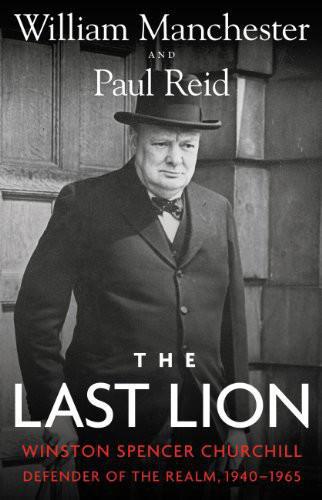
Defender of the Realm, 1940-1965
The Last Lion: Winston Spencer Churchill, Volume 3
کتاب های مرتبط
- اطلاعات
- نقد و بررسی
- دیدگاه کاربران
نقد و بررسی

Starred review from September 3, 2012
Before his death in 2004, an ill Manchester asked former Cox newspapers journalist Reid to take his research notes and finish writing the final volume of his trilogy. The long-delayed majestic account of Winston Churchill’s last 25 years is worth the wait. Sixty-five when he became Britain’s prime minister in 1940, Churchill remained a Victorian aristocrat, self-indulgent, coddled by servants. Yet his vitality, charisma, and self-assurance made him a perfect leader in a crisis. During his first year, when Britain fought Nazi Germany alone, Churchill, say the authors, may have saved civilization. Once the U.S.S.R. and U.S. joined, Britain’s role declined but not Churchill’s energy. While FDR left war to his generals, Churchill poured out ideas, many of them imaginative failures (the bloody landing at Anzio) or simply bad (early opposition to invading France). Despite Churchill’s unparalleled popularity, his Conservative party was defeated in July 1945. Though devastated, Churchill remained the party leader, returning to office in 1951 to preside over a declining empire and escalating cold war until a repeatedly postponed retirement in 1955. Manchester (and Reid) matches the outstanding quality of biographers such as Robert Caro and Edmund Morris, joining this elite bank of writers who devote their lives to one subject. 32 pages of b&w photos, 6 maps.

Starred review from September 15, 2012
A (very) posthumous study of the late, great British leader by the late, great popular historian, aided by journalist Reid. Just before Manchester (A World Lit Only by Fire: The Medieval Mind and the Renaissance--Portrait of an Age, 1992, etc.) died in 2004, he handed over the task of finishing his Churchill biography to Reid, who retains Manchester's habit of writing at extreme length, and it's clear where Manchester left off in his own primary research: Though the book spans the years 1940 to Churchill's death in 1965, roughly only one-tenth of it covers the "lion's" last 20 years, while the vast bulk is given over--fittingly enough--to Churchill's leadership as British prime minister during World War II. The documentation would not pass a professional historian's muster, but Manchester never wrote for historians, and general readers, as always, will be taken by his boundless abilities as a storyteller. Manchester also saw patterns that may not have been apparent to most other writers. Whereas Hitler was famously known as an artist manque, Churchill "came at every issue with a painter's eye," whether developing a battle plan for the invasion of Italy or "parsing geopolitical matters such as continental hegemony." The great-man theory of history, too, may be passe in academia, but Manchester/Reid gladly subscribe to it, with an account of the friendship of Churchill and Franklin Roosevelt (and rivalry with Josef Stalin) that is both searching and unsentimental. The authors clearly admire Churchill, for reasons that they make evident throughout, but there is little in the way of hero worship. Indeed, their critical account of Operation Torch--which Dwight Eisenhower exaggeratedly called "the blackest day in history"--is thorough and convincing, and it does not reflect well on the cigar-chomping PM. The manuscript is replete with Manchester's journalistic flourishes, some of which cross into cliche, and it's as much a monument to the author as to its subject. Essential for Manchester collectors, WWII buffs and Churchill completists.
COPYRIGHT(2012) Kirkus Reviews, ALL RIGHTS RESERVED.

June 1, 2012
With the help of notable journalist Reid, Manchester here wraps up his magisterial biography of Winston Churchill, begun with 1983's Visions of Glory, 1874-1932 and 1988's Alone, 1932-1940. (After he became ill in late 2003, Manchester asked Reid to complete the work; he died in 2004.) It's no surprise that this final volume has been over 20 years in the making, given the period it covers--starting with the war, which truly showed how Churchill could roar. Something like 440,000 copies of the first two volumes are currently in print (after all these years); expect big numbers (and demand) for this last, crucial piece.
Copyright 2012 Library Journal, LLC Used with permission.

Starred review from October 15, 2012
The second volume of the late Manchester's Churchill biography (The Last Lion: Alone, 1988) left its audience in suspense with Churchill's appointment as British prime minister in May 1940 and in anticipation of how Manchester would present Churchill's and Britain's finest hour in WWII. Foiled by illness, Manchester tapped Paul Reid, who has magnificently completed Manchester's work. Opening with a character sketch of Churchill in his multifaceted guises of sentimentality, egotistical insensitivity, and brilliance, Reid dives into Churchill's war leadership in 1940 that is the cynosure of his place in history. Reid's got the research right, down to the day, down to the minute. He shows Churchill defying Hitler and appeasersthe French leadership and figures in the British governmentwho even in 1940 thought peace could be arranged with the triumphant Nazis. As Reid chronicles Churchill's public speeches, communications, and strategy sessions, he affords regular glimpses at Churchill's private aspectshis wittiness, sybaritic consumption of scotch and cigars, and moods bordering on depression. If reading Churchill's life after 1945 entails an unavoidably anticlimactic quality, Reid nevertheless ably chronicles its main events of writing his WWII memoirs and assuming his second premiership of 195155. Manchester was one of the best Churchill biographers, and this capstone to his magnum opus ought not be missed.(Reprinted with permission of Booklist, copyright 2012, American Library Association.)

























دیدگاه کاربران